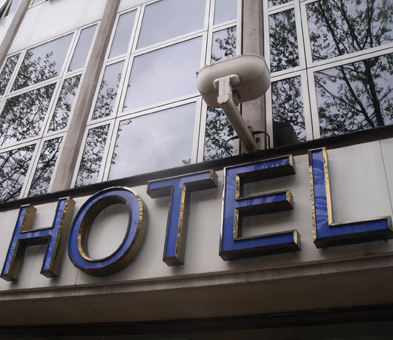Security in the hospitality industry can be a tricky area to navigate. As a hotel owner it’s important to ensure the safety and wellbeing of your customers and staff at all times. Security incidents that take place at your venue can harm the business name and revenue. It’s important to put in place adequate procedures and technology. Not only will this prevent incidents from occurring, but also allows you to provide a thorough investigation should something happen. It will also inform your guests that you have their safety in mind and avoids accusations of doing little or brushing an incident under the carpet. At the same time, it’s important to balance this with guest experience. You don’t want to burden and scare away your customers with authoritative rules and a lack of privacy.
More than ever it’s important to keep on top of the risks and challenges of running a hotel. The Richmond Hotel, a luxury apart hotel in Liverpool, have compiled a summary of some of the most common security challenges that hotels of today must tackle in order to secure their guests and business.
Theft
One of the most obvious challenges that a hotel faces is theft. When staying at a hotel, guests will typically bring several personal belongings with them and safekeeping is a common concern. Breaking into rooms or pickpocketing can be a problem if you don’t take necessary precautions. It should be a standard practice in the modern age that all hotels offer secured storage such as safes to allow guests to store their most important belongings. Of course, this doesn’t eliminate the problem, but does transfer some sense of responsibility from the hotel to the guest. You should do what you can to keep the rooms secured and prevent unauthorised visitors from entering the hotel. In some cases, blame can be pointed towards staff if a personal item goes missing. If this happens, it can be tough to side with a potentially lying customer or an unfaithful employee. Suitable technology and procedures can help determine the truth should an allegation land on your feet.
Another area for hotels to consider is in terms of customer parking. Criminals often view tourists as vulnerable which means that they can use hotels as the ideal location for theft. If you have car parking on-site, criminals may carry out car robberies, especially due to the likelihood of customers leaving their car unattended for long periods of time. Hiring car park attendants or implementing CCTV technology can reduce the risk of this happening or remove some responsibility from your shoulders should it happen. In some cases, the car park may not be your property and therefore not your responsibility should an incident occur, something which should be clearly instructed to the customer before they arrive.
Restricted areas
Similar to our previous point is the role restricted areas play in running a hotel. In this instance, a restricted area can be defined as a location of the hotel that is only intended for a person of a certain role. Whether someone gains access by mistake or with illegal intentions in mind, security systems and surveillance cameras can help restrict access where required. Customers shouldn’t be able to access private staff areas, especially if sensitive data is held there. Likewise, staff should only enter customer rooms when required, such as in an emergency or to carry out tasks relevant to their role at the hotel. In certain circumstances there may be a more in-depth hierarchy in terms of role access among staff rather than providing all access to every employee. Protecting staff entrances with secured access controls such as key cards or codes can be extremely efficient.
Cyber
Physical theft is not the only form of robbery that can take place as a hotel. There are several cyber threats that can be present, such as identify theft. Once again, hotel guests can be seen as vulnerable and organised criminals can use this to their advantage. Identify theft is on a much larger scale than a physical crime and can often involve target multiple people at once. If you fail to properly secure your network, a cyber criminal can hack into the network and steal sensitive guest information such as personal details and credit card information. If your hotel allows customers to use Wi-Fi, then this also needs to be protected to avoid the customer using the internet unsecured.
Emergencies
When it comes to active emergencies, communication is extremely vital for venues housing large amounts of people. Hotels can be large spaces with hundreds of guests, making this a challenging task. You should make sure that guests are provided documents relating to either on arrival or before. This should, for instance, state key information such as exit zones and Emergency Assembly Points. However, the reality is that a lot of guests will fail to take in this information. You should test alarm systems regularly to ensure they are in working order and perhaps consider an intercom system for sending clear announcements. Your employees should be aware of what their role is in an emergency and how they can help guide guests in case of an evacuation.
Disorderly conduct
If you work in the hospitality industry then you’ll know that while most people are sensible and well-behaved, there’s always some who can go too far. Boisterous and drunk guests can become hostile, resulting in physical attacks on other guests or staff, or damage to property. If you have a bar, ensure that bartenders are aware of when to stop serving alcohol to a guest who has had too much to drink. Keeping tabs on how your guests are behaving and kicking out unruly guests following suspicious behaviour or complaints can help prevent disorderly conduct. Security guards are also extremely important in keeping the peace and behaving firm when physical contact is required.










